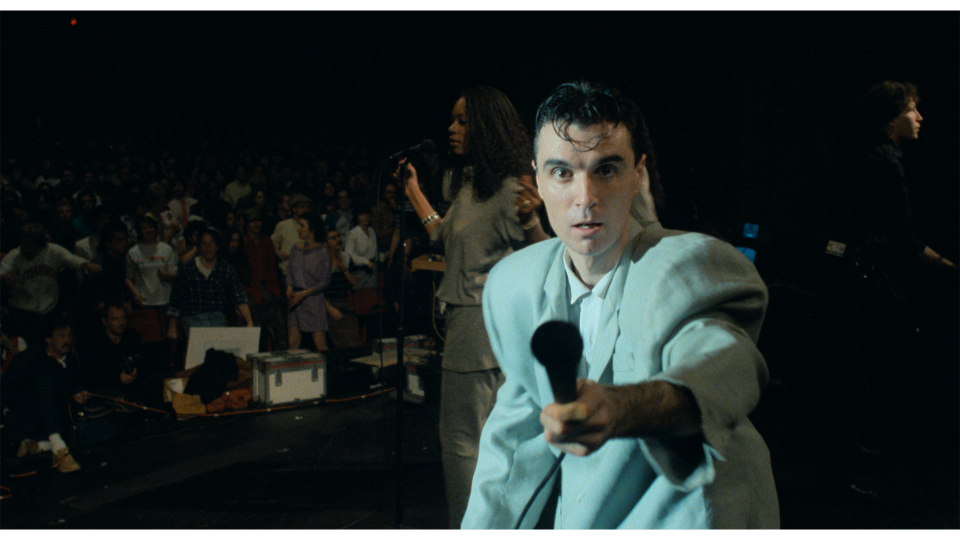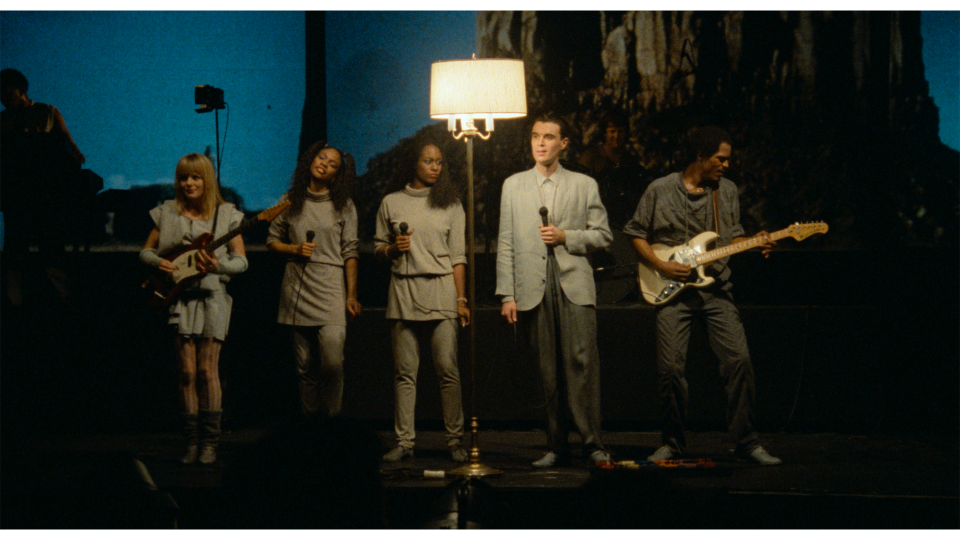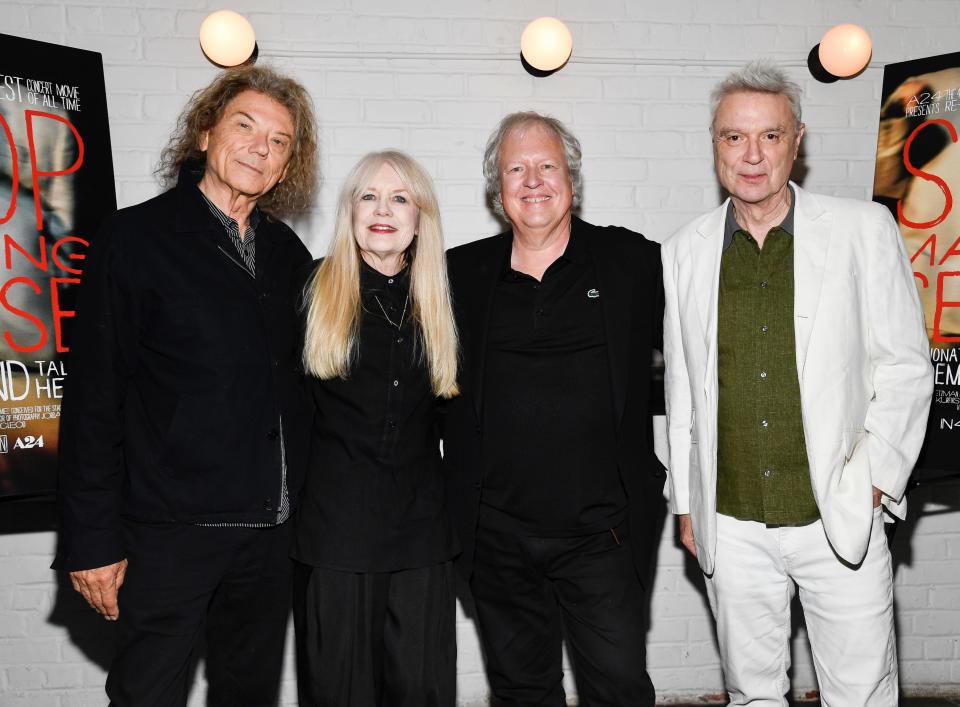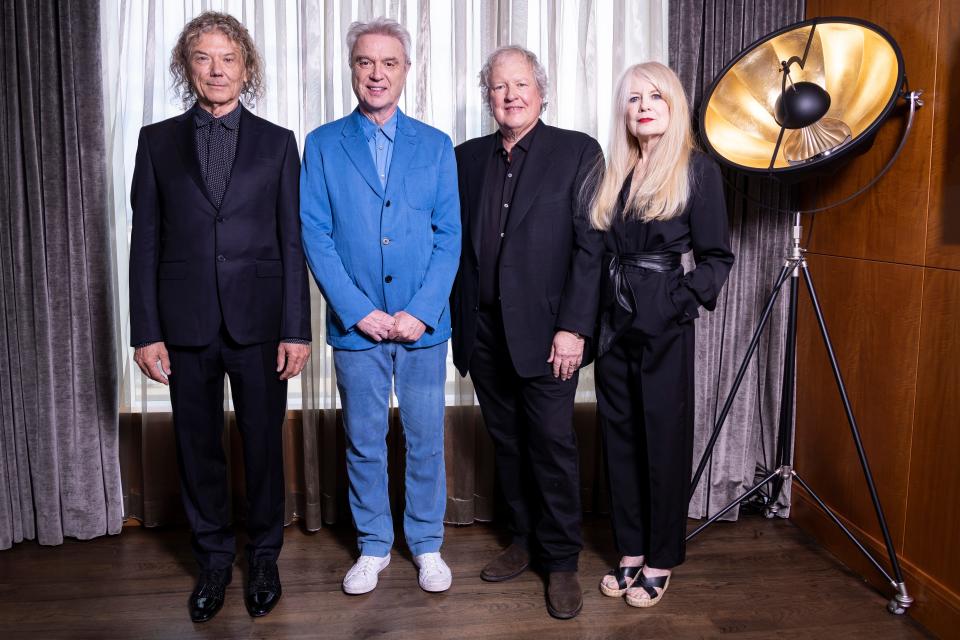Talking Heads reflect on 'Stop Making Sense,' say David Byrne 'wasn't so tyrannical'
- Oops!Something went wrong.Please try again later.
- Oops!Something went wrong.Please try again later.
- Oops!Something went wrong.Please try again later.
- Oops!Something went wrong.Please try again later.
- Oops!Something went wrong.Please try again later.
NEW YORK – It’s a costume so colossal, it gets its own billing.
“Mr. Byrne’s Big Suit” is named in the end credits of “Stop Making Sense,” the Talking Heads’ rapturous 1984 concert film. Gail Blacker’s supersized creation is gloriously on display during "Girlfriend is Better," a rollicking showstopper in which David Byrne shakes and shimmies in boxy gray duds.
“At that point in the show, it’s pretty hot under there, so I got the jacket off as soon as I could,” Byrne recalls with a laugh. “I didn’t want that whole jacket to get soaked – that would not be a good look.”
The now-iconic outfit – which Byrne likens to “those playing cards in ‘Alice in Wonderland’” – has been mimicked by everyone from Miley Cyrus to Kermit the Frog, with Fall Out Boy rocking similar garb at last week’s MTV Video Music Awards.
But even still, “I have no idea why that (suit) became a thing,” Byrne says.

Jumbo jackets are just a small part of the legacy of “Stop Making Sense” (in IMAX theaters Friday, everywhere Sept. 29), which has been crisply remastered and rereleased by A24. Directed by the late Jonathan Demme (“The Silence of the Lambs”), the movie is widely considered “the greatest concert film ever,” as director Spike Lee declared during a recent Q&A with the new wave band at the Toronto International Film Festival.
Captured over three nights in December 1983, the 90-minute film is pure joy encapsulated. We dare you not to smile during "Burning Down the House," as Byrne buoyantly runs in place with touring guitarist Alex Weir. Or in "Take Me to the River," when background vocalist Lynn Mabry cracks up midchorus at the sight of Byrne in his enormous pants.
“It’s just so much fun,” says keyboardist-guitarist Jerry Harrison, 74, seated with Byrne at an East Village hotel. “We exude that we’re having fun on stage, and that comes out to the audience. In a lot of concert films, it's interesting to zero in on a guitar player’s hands, but it’s not exactly fun. Jonathan did a wonderful thing of capturing the personalities and the interactions between (us). Also, the music is just great to dance to.”
Unlike the majority of concert movies, Demme’s film is not intercut with interviews or behind-the-scenes footage. Instead, he allows the performance to just play out in its entirety.
“Thank God we didn’t do the interviews,” says bassist Tina Weymouth, 72. “That’s the flaw of most ‘rockumentaries.’ We speak so much better through our instruments. With The Band in 'The Last Waltz,' there was way too much Robbie Robertson. And we did watch 'Spinal Tap' and say, ‘Oh, my God. I think I said things as stupid as that once.’”
“We were like, ‘We can never take ourselves seriously again,’” jokes drummer Chris Frantz, 72, who is also Weymouth’s husband.

Some of the movie’s most hypnotizing moments are of Byrne, swaying back and forth with a floor lamp or jogging laps around the stage. At times, his contorting dance moves seem to defy physics.
“As the show progresses, there’s this feeling of surrendering to the groove,” says Byrne, 71. “It’s a kind of possession; of letting go of your sense of self, and letting yourself be taken by the music and the group and the community. And you get something bigger than yourself in return.”

Much of the excitement around the movie’s rerelease has been the unlikely reunion of Talking Heads. Until this month, the band’s four original members hadn’t all been in a room together since 2002, when they were inducted into the Rock and Roll Hall of Fame. The art-funk group first came together in 1975, finding mainstream success with now-timeless hits including "Once in a Lifetime," "Psycho Killer" and "This Must Be the Place (Naive Melody)."
But after eight albums, the band dissolved in 1991. Byrne described it as an “ugly” split in an interview with People magazine last month and expressed regret over his controlling, sometimes unpleasant behavior.
He’s since learned to be a better collaborator, a lesson that’s come with “time and experience working with other people,” Byrne says now.
“I’ve got to say, it wasn’t so bad,” Harrison chimes in. “It wasn’t so tyrannical. That didn’t mean I didn’t get pissed off once in a while, or like, ‘Why didn’t he listen to me about this?’ But everybody in the band contributed; there was a real interplay of ideas. And David’s the singer, so there’s a leadership there that … it’s not implied, but it’s obvious it would be there. So I think it can be exaggerated.”

Weymouth and Frantz have been open about past tensions with Byrne, calling him “competitive,” “insecure” and “Trumpian" in previous interviews and op-eds. Today, they're more diplomatic, as the foursome cordially promotes the film at various events.
“He's never going to apologize, but that’s just not in his vocabulary,” Weymouth says, in a separate sit-down with Frantz. She reiterates just how “beautiful” the experience of “Stop Making Sense” was, and how all the happiness captured on screen was genuine.
“The press always does love a conflict, and we totally understand why people might be curious about the inner workings (of the band),” Weymouth says. “But for whatever little family feuds, we had the perfect chemistry, musically and artistically. So it seems foolish, in this world where there’s so much suffering, to even dwell on all these petty things.”
And now, Frantz adds, “we all agree that this rerelease of ‘Stop Making Sense’ is going to help the legacy of Talking Heads, and we all agree that Talking Heads was a unique and really rocking band and that it’s worthwhile for all of us to be here. And we’re getting along fine – it ain’t no thang.”
This article originally appeared on USA TODAY: Talking Heads on 'Stop Making Sense,' why David Byrne 'wasn't so bad'

